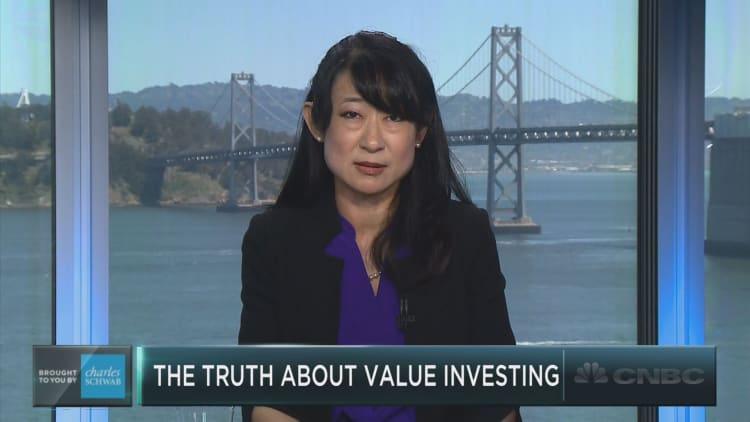
Value investing isn't as easy as you might think.
That's the basic message conveyed by U-Wen Kok, Jason Ribando and Richard Sloan in their paper "Facts about Formulaic Value Investing," which was recently published in the "Financial Analysts Journal."
Their beef is with strategies that scan for stocks with low price-to-earnings or price-to-book ratios, and upon finding them, declare the stocks offer compelling value to investors. Such quantitative value-seeking strategies have become increasingly common, but the authors argue that all they do is "systematically identify companies with temporarily inflated accounting numbers" and hence "should not be confused with value strategies that use a comprehensive approach in determining the intrinsic value of the underlying securities."
For instance, an investor who is looking to buy undervalued stocks might select one with a low price-to-earnings ratio. The implicit hope is that the price would rise such that its price-to-earnings ratio will
A study performed by the authors "shows strong evidence of mean reversion for the cheap stocks," but also found that "all the mean reversion in the high forward-earnings-to-price ratio is driven by forecasts of falling earnings. Stocks with high forward-earnings-to-price ratios are not cheap stocks; they are stocks that temporarily have forecasts of high earnings."
An interesting case study is the treatment of energy stocks following the collapse in oil prices that began in the summer of 2014. The equities themselves began to fall, but corporate balance sheets did not yet reflect the macro problems the companies were facing.
This lag meant that "the book values remained high, so they looked cheap, and consequently, value indices picked them up," Kok said in an interview Wednesday on CNBC's "Trading Nation." "Then, 12 months later, you saw that book values start to get revised down. And that's pretty problematic when people think they're getting something that's cheap with good value, but in
Unsurprisingly, the authors also found that such strategies do not appear to deliver particularly good investment performance.
As the reference to indices makes clear, this is not a merely academic problem. Money is pouring into funds with "value" in their names, including ETFs such as the Vanguard Value ETF (VTV) or the iShares Russell 2000 Value Index (IWN), a trend to which the authors turn a gimlet eye. Kok is chief investment officer for the developed markets team at RS Investments, which specializes in actively managed equity strategies.
"The Russell Indexes were developed to be transparent, rules-based representations of the US Equity Market and its various segments," a spokesperson for FTSE Russell wrote to CNBC in response (Vanguard declined to comment; iShares parent BlackRock did not respond to a request for comment). "Determining the correct intrinsic value of a company is a complex exercise requiring a variety of information and skill. One of the key roles of an index is to provide a simple and transparent framework for evaluating the success of investment managers who are engaged in the process of security analysis. For many investors, Russell index-based products also represent an efficient, low-cost way to get access to these areas of the market without requiring unique information or substantial analysis."
It could be argued, however, that "value stocks" is not a segment of the market in the same way "biotech stocks" or "high-dividend stocks" are. "Value" is an abstract adjective — as the famous Warren Buffett adage goes, "Price is what you pay; value is what you get." And for Kok, it is simply not something that a quantitative screen can find by itself.
Fundamental-to-price ratios are "historical" and "accounting-based" and thus "don't really reflect the true, underlying economics of the companies," Kok said. "You still need to have a pair of human eyes."






